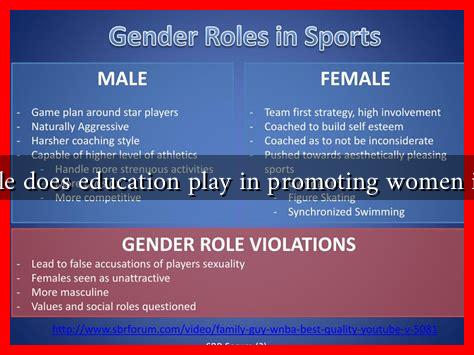-
Table of Contents
What Role Does Education Play in Promoting Women in Sports?
Education is a powerful tool that shapes individuals and societies. In the realm of sports, it plays a crucial role in promoting women’s participation, empowerment, and leadership. This article explores how education influences women’s involvement in sports, the barriers they face, and the initiatives that are making a difference.
The Importance of Education in Sports
Education provides the foundation for understanding the value of sports, both as a means of physical fitness and as a platform for personal development. It equips women with the knowledge and skills necessary to excel in various sports disciplines. Here are some key aspects of how education impacts women in sports:
- Skill Development: Educational programs often include physical education, which helps women develop athletic skills from a young age.
- Awareness of Opportunities: Education raises awareness about available sports opportunities, scholarships, and career paths in athletics.
- Leadership Training: Many educational institutions offer leadership programs that empower women to take on coaching and administrative roles in sports.
- Health Education: Understanding the importance of physical health and fitness encourages women to participate in sports.
Barriers to Women’s Participation in Sports
Despite the positive impact of education, women still face numerous barriers in the sports arena. These challenges can be exacerbated by a lack of educational resources or support. Some common barriers include:
- Gender Stereotypes: Societal norms often discourage women from pursuing sports, leading to a lack of participation.
- Limited Access to Facilities: In many regions, women have less access to sports facilities and training programs.
- Insufficient Funding: Educational institutions may prioritize funding for men’s sports, leaving women’s programs under-resourced.
- Safety Concerns: Issues related to safety and harassment can deter women from participating in sports activities.
Case Studies: Successful Educational Initiatives
Several initiatives around the world have successfully leveraged education to promote women’s sports. Here are a few notable examples:
- Title IX (USA): Enacted in 1972, Title IX prohibits gender discrimination in federally funded education programs. This legislation has significantly increased female participation in sports at schools and colleges across the United States.
- Women’s Sports Foundation (USA): This organization provides grants and scholarships to female athletes and promotes educational programs that encourage girls to participate in sports.
- Girl Up (Global): A United Nations Foundation initiative, Girl Up empowers girls through education and sports, providing resources and support to help them become leaders in their communities.
Statistics Highlighting the Impact of Education
Statistics underscore the importance of education in promoting women’s sports:
- According to the Women’s Sports Foundation, girls who participate in sports are 6 times more likely to graduate from high school and 3 times more likely to graduate from college.
- A study by the National Federation of State High School Associations found that female participation in high school sports has increased by 1,000% since the passage of Title IX.
- Research indicates that women who play sports are more likely to hold leadership positions in their careers, demonstrating the long-term benefits of sports participation.
Conclusion: The Path Forward
Education plays a pivotal role in promoting women’s participation in sports by providing the necessary skills, knowledge, and opportunities. While significant progress has been made, challenges remain. To further enhance women’s involvement in sports, it is essential to:
- Continue advocating for policies that support gender equality in sports.
- Invest in educational programs that promote sports for girls and women.
- Encourage community involvement to create safe and supportive environments for female athletes.
By addressing these issues and leveraging the power of education, we can create a more inclusive sports landscape that empowers women and girls to pursue their athletic dreams. The journey towards equality in sports is ongoing, but with education as a cornerstone, the future looks promising.
For more information on women’s sports initiatives, visit the Women’s Sports Foundation.

